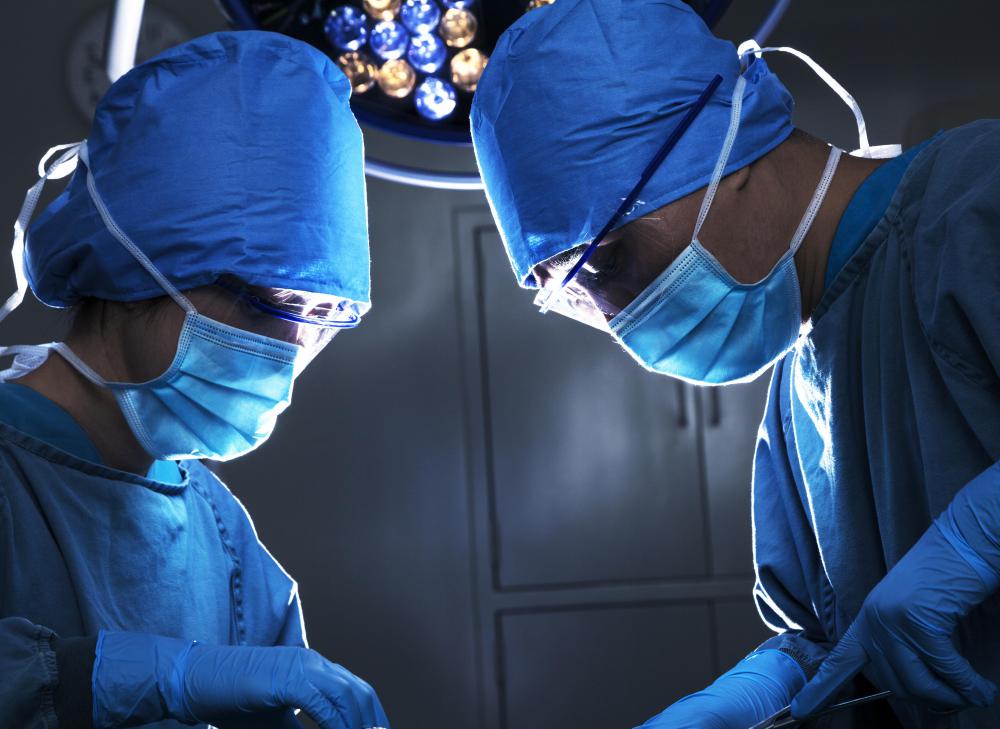At WiseGEEK, we're committed to delivering accurate, trustworthy information. Our expert-authored content is rigorously fact-checked and sourced from credible authorities. Discover how we uphold the highest standards in providing you with reliable knowledge.
What is a Thyroidectomy?
A thyroidectomy is a removal of part or all of the thyroid gland, which is located at the base of the neck. When the surgery is total, the entire gland is removed. However sometimes the surgery removes only part of the gland, and may be called partial removal or a thyroid lobectomy. Advantages to leaving some thyroid gland present include that the gland can continue to produce hormones needed by the body and may reduce risk of hypothyroidism (low levels of thyroid hormones).
There are a number of reasons why people might require a partial or total thyroidectomy. These can include overactive thyroid, thyroid cancer, and enlargement of the thyroid (sometimes called goiter). Occasionally removal is not done surgically but instead radioactive substances are used to shrink the gland. Still, some people may prefer the surgery, especially if they want to avoid these substances and this could include women who are currently pregnant or who would like to get pregnant soon after thyroidectomy and children whose parents may favor little exposure to radioactive substances. From a cosmetic perspective too, thyroidectomy may be favored especially to treat very enlarged glands.

Different types of surgeons may perform a thyroidectomy and these can include otolaryngologists who specialize in surgery of the head and neck. Others who may assist or be part of the surgical process include endocrinologists. In the most straightforward types of surgery, an incision at the base of the neck gives access to the gland and then all or part of it is incised or removed. There are some variants of the surgery considered less invasive and less likely to scar and these include minimally invasive video assisted thyroidectomy (MIVAT). Sometimes access to the thyroid is not at the base of the neck but instead is under the arm, and incisions are much smaller.

Usually the surgery is performed under general anesthesia, and people can expect to stay a night or two in the hospital afterward. Though this is still rare, sometimes thyroidectomy occurs under local anesthesia, and hospital stay may not exceed a night. Most of these surgeries are still not performed on an outpatient basis.
In recovering from a thyroidectomy, people may have a very sore throat and weak voice which usually resolves within a few weeks. In about 1% of cases, there is permanent damage to the larynx that will continue to affect voice quality. More common complications after this surgery include having too little thyroid hormone or lower than normal calcium levels. These can be addressed with supplementation of hormones and minerals. Those who have total thyroidectomies are likely to require thyroid supplementation for life.

When the reason for the surgery is cancer, doctors may perform a follow-up step to destroy remaining cancerous cells. This can include chemotherapy or treatment with radioactive iodine. Follow-up work can take a couple of months after surgery, in order to make certain all cancerous cells are gone. Cancer of the thyroid is not a particularly invasive cancer, but it nevertheless requires eradication to prevent spread.
AS FEATURED ON:
AS FEATURED ON:













Discuss this Article
Post your comments